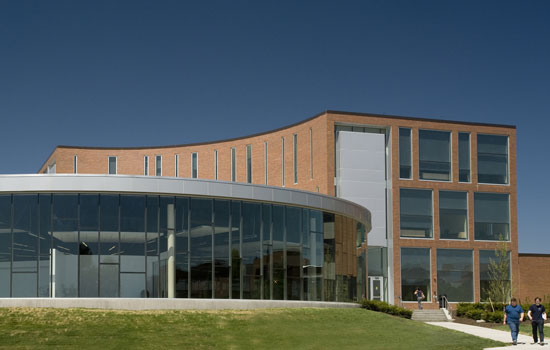RIT’s University Services Center Certified LEED Platinum
Building becomes first facility in Monroe County to receive highest ‘green’ designation
A. Sue Weisler
RIT’s University Services Center is only the second facility at a college or university in New York to be certified LEED Platinum
Rochester Institute of Technology has achieved the pinnacle in recognition for sustainable construction and design. The new University Services Center at RIT has been certified LEED Platinum by the U.S. Green Building Council, which represents that organization’s highest designation.
RIT’s University Services Center becomes the first building in Monroe County to receive platinum certification. It is also only the second such designated facility at a college or university in New York.
LEED, or Leadership in Energy and Environmental Design, provides third-party verification that a building’s design incorporates strategies aimed at improving performance across specific categories that include sustainable sites, water efficiency, energy and atmosphere, materials and resources, indoor environmental quality, and innovation and design process.
The three-story and 54,000-square-foot University Services Center opened last summer and serves as the administrative hub for various RIT support services. Its centerpiece is the circular, glass-enclosed Student Innovation Center. According to Witold Bujak, RIT’s sustainability manager, creative and high-tech design solutions were implemented to cause minimal environmental impact during construction and throughout the building’s occupancy.
“The latest LEED Platinum achievement is a new benchmark for our university with far-reaching impact on our future design, engineering and construction practices where superior performance, finalized with a successful project commissioning, becomes a new norm,” explains Bujak. “This latest success—combined with the Presidents’ Climate Commitment initiative and the university’s sustainable curriculum and research—sends a strong signal that RIT is on its way to becoming a sustainable leader.”
Sustainability highlights from the University Services Center’s operation include:
- 48.6 percent energy cost reduction over industry standards for heating and cooling efficiency
- 43 percent reduction in water usage over national requirements for fixture performance
- 35 percent of the building’s electricity is supplied from renewable sources, including on-site solar photovoltaic panels
- 33 percent recycled content of materials used in facility’s operation
The University Services Center is located on a previously developed site on campus that is accessible from existing parking and multiple public transportation lines. To encourage alternative transportation, the facility offers secure bicycle racks and changing rooms that feature showers.
Extensive measures were taken during the building’s construction to minimize environmental impact, including an erosion and sedimentation control plan. In addition, 89 percent of construction waste was diverted from landfills and recycled. To limit the cost and environmental impact resulting from transportation, RIT acquired more than 20 percent of the materials and products necessary for the project from within a 500-mile radius.
In an effort to promote biodiversity, the project restored 50 percent of the site with native and adapted vegetation that is indigenous to the region. RIT also designated open space on campus equal to the building’s footprint that will be preserved for the life of the building.
Members of the University Services Center project team included RIT’s Facilities Management Services, Chaintreuil Jensen Stark Architects, IBC Engineering, Erdman Anthony, Jensen Engineering, SAIC, Sustainable Performance Consulting, and Welliver McGuire.
The University Services Center is the latest RIT facility to receive U.S. Green Building Council acknowledgement. In 2008, the university’s College of Applied Science and Technology building was designated LEED Gold—the second highest level of achievement.













